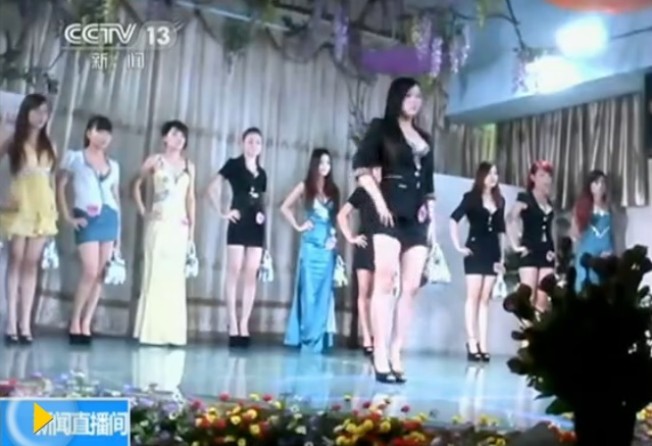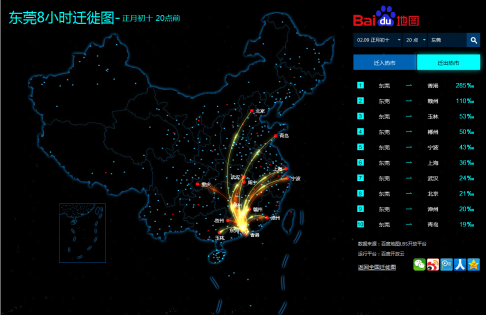Police crackdown on Chinese ‘sex capital’ Dongguan prompts surprising outpouring of sympathy

Dongguan, a Guangdong city dubbed the “sex capital of China” for its thriving underground sex industry, may be facing the largest police crackdown in years after a report by state television CCTV investigating the illicit trade. But the renewed police action has been met with an unexpected social media campaign rallying ‘moral support’ for the city.
The campaign, appearing to be spontaneous and not formed from any one organisation, has seen a large number of online users of social networking websites posting and sharing encouraging phrases such as “Dongguan, hang in there!” or “Today we are all Dongguan people,” popular catchphrases often used in China to cheer people up after huge disasters.
The former phrase was searched for almost 130,000 times on China’s most popular microblogging site, Sina Weibo, and became the second most searched term as of Monday afternoon. “CCTV, Dongguan” was the fourth most searched term.
The crackdown followed CCTV’s lengthy investigative report which was aired on Sunday morning. Footage taken by undercover journalists using hidden cameras revealed in vivid detail various underground prostitution activities in a number of luxurious hotel-turned brothels.
Watch: CCTV news report on sex trade in Dongguan
Just hours after the report, Dongguan police quickly dispatched more than 6,500 police officers in a citywide sweep to its entertainment venues, shutting down a dozen of them and suspending two police chiefs. The action also saw the arrests of 67 people allegedly involved in prostitution.
Chinese media reported the order to “strictly handle” the situation that was directly given by Guangdong party secretary Hu Chunhua, who is also part of a group of the 25 most powerful Communist Party elites, after he watched the CCTV report.
The swift response appeared to have failed to impress some online netizens who responded with scorn and cynicism.
Some asked: “How come it took more than 6,000 police officers to only bust 67 people?”. It was speculated that tip-offs may have prompted many of those involved in prostitution across the city to flee.
Interestingly, the speculation coincided with the publicised data of search engine giant Baidu, China’s Google, whose newly-launched interactive website showed a surge of people departing from Dongguan for Hong Kong on Sunday night.
The website, which tracks the movement of hundreds of thousands of its mobile app users across the nation using their GPS coordinates, recorded a consistent outward-bound stream to Hong Kong throughout Sunday night until early Monday morning. Baidu said that of its customers it had tracked leaving Dongguan that night, the number leaving for Hong Kong accounted for over one quarter. This has prompted some online users to suspect they were potentially customers or sex workers fleeing to Hong Kong from Dongguan, although there is no concrete evidence to support this theory about the identity of the Hong Kong-bound travellers.
The United Nations also chipped in during heated online discussions on the issue. On Sunday night it pointed out on its verified weibo account that those who conduct prostitution activities should be referred as “sex workers” instead of “discriminating” labels such as “prostitutes”, quoting a guideline it published earlier this month.
Despite the posting not mentioning the CCTV report or Dongguan, many viewed it as a veiled criticism against the investigative report which frequently used the word “prostitutes” in the report.
Many others viewed it as a laughing matter, poking fun at those who got caught despite the media revelations that went viral half a day ahead of the police crackdown.
“Two groups of people have been caught out by the CCTV exposure and police clampdown: those who do not watch CCTV, and those who are not familiar with social media apps”, read one online comment.
“The arrested only now truly realises what the phrase ‘mobile changes life’ means,” quipped another blogger, referring to a catchphrase of mobile network operator China Mobile.
“Such widespread online backlash against CCTV reflects the divide and confrontational nature of society”, said media commentator Cao Lin. Writing on his weibo, Cao said CCTV’s video was widely viewed as an embodiment of the authoritarian regime, while sex workers have been perceived as the underclass victims of oppression. “Such conflict dictates the general public opinion on the issue,” he added.
Watch: Dongguan prostitution exposed by CCTV
Shi Feike, a veteran journalist and media commentator, wrote: “The unexpected public backlash underlines ... the gaping disagreement between the public and the authorities, further aggravated by the expanding public discourse brought on by burgeoning social media tools.”
A manufacturing boomtown located between Guangzhou and Shenzhen in the Pearl River Delta, Dongguan is an export hub city in Guangdong province and home to more than eight million people, most of them migrant workers from inland provinces. The city has long been notorious as a hotbed of underground sex services. The number of sex workers in the city could be as high as 300,000, according to some local media estimates.
In an earlier major police crackdown on prostitution in 2010, 57 were detained while several hotels closed down in Dongguan.

